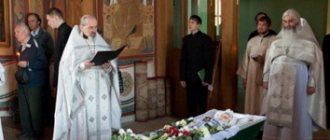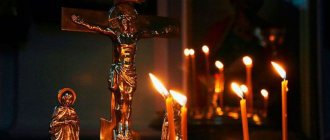How many days after death are funerals organized?
In Orthodoxy, special significance is attached to the number “3”. The Holy Trinity consists of the Father, Son and Holy Spirit, the theological virtues include faith, hope and love. The sacred meaning of the number is confirmed by the presence in the Gospel of 3 wise men, the same number crucified on Golgotha, and the resurrection of Jesus Christ on the third day after death.
Orthodoxy believes that the soul breaks ties with the body gradually. The ancient Slavs were also sure of this, who cremated the deceased after the priest read parting words from the “Book of the Dead” to the deceased for 3 days in a row. Our ancestors believed that the intangible component of a person remains on Earth until 40 days after death. Special rituals - ablution, crod, funeral feast, lists - helped make the separation of the soul and body as painless as possible.
Christian customs pursue the same goal. According to the Orthodox tradition, the soul leaves the body on the 3rd day, Tretina, and, together with its guardian angel, goes to the Kingdom of Heaven. There, from days 3 to 6, she observes the indescribable beauty of the heavenly abode. According to customs, they are buried on the 3rd day; it must be counted from the moment of the person’s death, even if the tragic event occurred closer to midnight. Thus, a person who died on November 12 at 23.00 is supposed to be given land on the 14th, not the 15th. The third day is also associated with the image of the Holy Trinity, a holiday that is associated with memorial rites. It was the moment of the resurrection of Christ that showed the world confirmation of the integrity of the trinity - the Holy Spirit emanating from God was revived by the Son of God.
On what day is it better to bury the deceased: historical background
They give it to the earth at a certain time and for completely everyday reasons. After stories about the burial of living people, the concept of taphophobia appeared - a panicky fear of ending up in a grave in a cemetery after a person was mistakenly considered dead.
History knows of cases where relatives, due to ignorance, buried loved ones who were in a state of deep fainting or lethargic sleep. Legend has it that the writer N.V. was buried alive. Gogol. The Italian poet Francesco Petrarca fell into a lethargic sleep for 20 hours, and only a miracle allowed his loved ones not to bury him on the day of his death, as was customary to do according to Italian laws of the 14th century. Due to the presence of taphophobia, the German philosopher Arthur Schopenhauer drew up a will in which he asked to count 5 days from the moment of his death and only then give it to the land. In Europe, delaying funerals for three days from the moment of death of a person was introduced by decree of Duke F. of Mecklenburg only at the end of the 18th century.
Is it possible to bury on church holidays?
The ability of the soul to freely enter the Kingdom of Heaven depends on when the funeral is held. Therefore, Orthodoxy does not allow this ceremony to be performed on the following major holidays, especially if they coincide with a Sunday:
- Nativity;
- Easter Sunday;
- Trinity;
- Protection of the Blessed Virgin Mary.
Funeral services that fall on Easter are supposed to be moved to Radunitsa. The Bible does not prohibit burying on Sunday. On the 3rd day after death, which falls on Monday, it is customary to bury suicides, and on Thursday - those who died from natural causes. Relatives of the deceased must remember that, regardless of the day of the week, they cannot perform funeral services and ask for commemoration in church, or bury people who have committed suicide in the cemetery. An exception is made for some groups:
- people with established mental illness;
- upon suspicion of violent death, which the criminals hoped to pass off as suicide;
- when the reasons for a person’s death are not fully understood.
On Good Friday, which falls on the 3rd day, no funeral ceremony is held. If there are any doubts about what day Orthodox Christians are buried, how to calculate and whether the date is set correctly regarding Christian holidays, relatives should consult with a clergyman. It must be remembered that within 3 days, if the rules of the ritual of repose are observed, the first phase of the separation of soul and body is completed.
Church funeral on Sunday and evening
According to religious Orthodox canons, the memory of the dead should be honored (buried taking into account customs, traditions, commemoration), and also pay tribute to the Lord and the Saints. It is necessary, first of all, to celebrate great holidays - to honor the memory of the Son of God (they celebrate the Resurrection of the Lord, His Nativity), the Mother of God.
But on other days (during Trinity, Forgiveness Sunday, etc.) it is allowed to perform burial rites and commemorations.
You should further clarify with the clergyman whether this is really the case. To confirm that funerals can be held on Sundays, we need to look at historical facts. It is known that the funeral of St. Tikhon (the last patriarch of the Russian Empire) took place precisely on the last day of the week. It was a memorable date - Palm Sunday.
There is no prohibition on performing burial rites according to the time of day. You can bury loved ones after lunch, which contradicts popular beliefs, according to which it is better not to visit the cemetery after 14:00. The Church does not welcome only midnight burial rites.
Orthodox Church
Church requirements
It is necessary to order a memorial service, a special funeral service, for Tretina. Commemorations on this day are in honor of the resurrection of Jesus Christ and in honor of the image of the Holy Trinity. A memorial service is served both in the church and in the cemetery during or after the funeral, at home with the relatives of the deceased. The prayers of not only the priest, but also those of loving people can facilitate the passage of the ordeal of the soul of the deceased. And such commemoration brings tangible benefits to the relatives and friends of the deceased themselves - it brings comfort and dulls the pain of the loss of a loved one.
In the recent past, after death, Christians read the Psalter for the deceased for 40 days and took prosphora for the deceased in church every day during the liturgy. Today, relatives of the deceased go to church on Tretina and attend the service with candles, a symbol of faith in a pure and bright future life. At the end of the prayer, the candle fire is extinguished as a sign that everyone’s earthly life will sooner or later also cease to exist.
Cases when a person is not buried 3 days after death
In summer, in regions where there is extreme heat and in exceptional circumstances (during wars, epidemics), clergy allow the farewell ceremony to be held earlier. Orthodoxy allows burial on days 4-6, depending on how the person died. To establish the causes of death, an autopsy procedure is performed, which lasts a certain time, especially if this occurs due to suspicion of violent death. Sometimes the relatives of the deceased have to wait for relatives and loved ones to arrive from afar, so funeral procedures are postponed, and the body of the deceased is embalmed. The procedure is carried out to preserve the aesthetic appearance of the deceased and to stop the processes of decomposition of the remains. Embalming and postmortem preparation are done in the morgue.
It is categorically not welcomed by Christianity to bury the deceased on the first or second day after death for no apparent reason. This is due to the belief that the spiritual substance of a person has not yet said goodbye to the body - its temporary bodily refuge. Forcibly breaking the connection before the onset of Tretina will lead to the fact that the soul will have nowhere to go. On the second day she should be with her family. In addition, contemplation of how its material container is consigned to the earth ahead of time in a coffin can cause inexpressible pain to the soul.
Exceptional circumstances for postponing the funeral date
The transfer of the day of burial may be due not only to the coincidence with the date of a great religious holiday, but is often explained by external reasons:
- climatic conditions: high average daily temperature is a direct reason to postpone the burial date 1 day earlier, although this is not recommended, it is better to plan the burial ceremony later than the expected date;
- epidemic, war, disaster: disruption of the usual rhythm of life often does not allow observing the timing of religious ceremonies; funerals can also be postponed, but it should be remembered that such a possibility is considered as a last resort, and not on an ongoing basis; environmental conditions are also taken into account ;
- cause of death: in Russia it is permissible to delay burial up to 5-7 days from the moment when a person gave up the ghost, which is due to a number of procedures for autopsy of the body, its identification, registration, there are such changes in the funeral procedure for DTV, as a result of which a person died, and cases when death occurred in the hospital;
- waiting for relatives: the presence of loved ones is important for the deceased, but he cannot express this, however, relatives in this case show an unprecedented level of empathy - they postpone the funeral to a later date so that all family members can come to support the soul of the deceased.
Early burial is an option chosen primarily in southern regions where temperatures are often high, but in summer this option may be considered in other areas where it is quite hot.
Funeral
Why are they buried 3 days after death: psychological reasons
Close people, even those who have been caring for terminally ill relatives for a long time, are never internally fully prepared for their death. There is nothing to say about the power of tragedy and grief when children die. Despite the concepts of eternal life and the liberation of the soul from earthly suffering, loss becomes a heavy blow that can only be realized after time. At first after death, it is difficult to accept the fact of a person’s passing, much less to make preparations for burial and farewell. Excessive grief and lamentation complicate the process of parting with the earth for the soul, because on the first day, according to Orthodox beliefs, it already experiences confusion. After some time, relatives and friends have an internal readiness to let go of the deceased - to decide on what day to hold the wake and how to conduct the funeral.
Due to these psychological nuances, carrying out the burial procedure some time after the death is completely justified. Therefore, on Tretina they bid farewell to the deceased and organize a memorial dinner.
Burial rite
The rite of burial of the deceased is a rite of farewell to the deceased, which has been customary to carry out in the Orthodox world since ancient times. It exists so that on this day one can express one’s respect and respect to people who have suffered death.
On this day, all the relatives, friends and acquaintances of the deceased gather to say goodbye to him forever and see him off on his last journey. The ritual also carries a powerful information message. Its holding reminds those present that their existence on earth is not eternal, which in turn should make many think about their lives.
The best article for you, go to: Home iconostasis: how to arrange icons, how to make it yourself
The Orthodox Church views funerals as a transition from earthly life to eternal life. To get to heaven a person must undergo special training. It consists of the following stages:
- Unction. If the death is not sudden, but the person was very ill, then before death the priest performs unction.
- Confession. Before death, a person must confess and ask for remission of all his sins.
- Conducting the communion ceremony. The priest must conduct the rite of communion to the dying person.
- Reading special canons. Since ancient times, prayers have been read to a dying person before death. This can be done by both the priest and relatives.
- Washing and changing clothes. After a person has died, he must be washed with clean water and wiped dry. This is done so that he appears clean before God. The deceased is also dressed in light and clean clothes. After this is done, it is necessary to cover the deceased with a shroud.
- Funeral lithium. It is read an hour before the coffin is taken out of the house. The priest sprinkles the coffin with holy water and conducts the funeral liturgy.
- Funeral service. Before the burial takes place, the priest reads a series of prayers and chants.
Only after all the stages described above have been completed is it believed that the deceased will be able to find eternal life in the next world.
Why it is not recommended to attend funeral ceremonies on a birthday
Birthday people often wonder if they should attend a funeral that coincides with their holiday? There are no restrictions on the part of the church on visiting a cemetery or interring a person’s body on his birthday. However, in the latter case, annual visits to the grave of the deceased by relatives for 3 years are mandatory.
According to an alternative point of view, human energy is especially vulnerable on the day of birth, as well as a week before and after the event. On a subconscious level, the birthday person re-experiences a traumatic episode of life - birth. Funerals and other mourning ceremonies that fall on this date should be attended if you need to see off a close relative on their last journey. However, you can reschedule the celebration to another time and remember the deceased without visiting the cemetery.
It is not difficult to calculate and find out the correct date of the funeral. This point is fundamental for a Christian believer. The daily count starts from the day of death. The first time, which lasts until the forties, is very important for the soul of the deceased to pass through all stages of dissociation from the body. Knowing on what day they are buried after death and the observance of traditions by the relatives of the deceased makes the hardships of the transition period easier for the soul. One of the rituals associated with the farewell of the deceased to the mortal world is the burial of the body, which is traditionally carried out on the 3rd day after death.
Funeral arrangements from the Honest Agent service
If you want the burial to take place in strict accordance with religious canons, please contact. We have been organizing funerals for many years, so we are perfectly familiar with all Orthodox traditions. Our employees know well how funerals are conducted, on what day a person must be buried and what rules must be followed when conducting a funeral ceremony.
When preparing for burial, our bureau provides comprehensive customer service. If you turn to the help of “Honest Agent”, you can count on the following services:
- preparation of the necessary documentation;
- preparation of the coffin and ritual accessories, taking into account the relatives’ budget;
- transportation of the deceased to the morgue and cemetery;
- digging a grave;
- farewell hall rental;
- installation of monuments and gravestones.
We understand well all the pain of your soul, therefore we work efficiently, carefully and with special attention to every detail. Contact us to bury your relative with dignity, taking into account Christian traditions. To receive advice or order funeral services, call us or request a call back!
Tell your friends:











